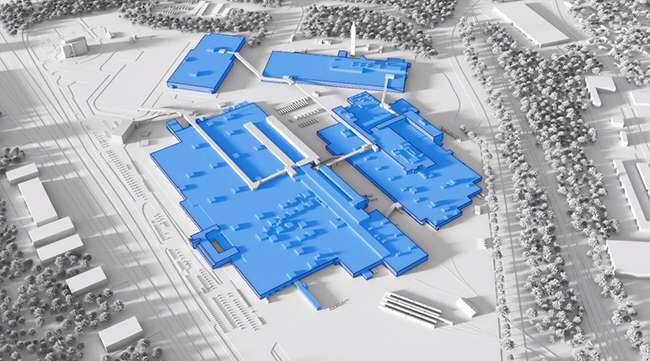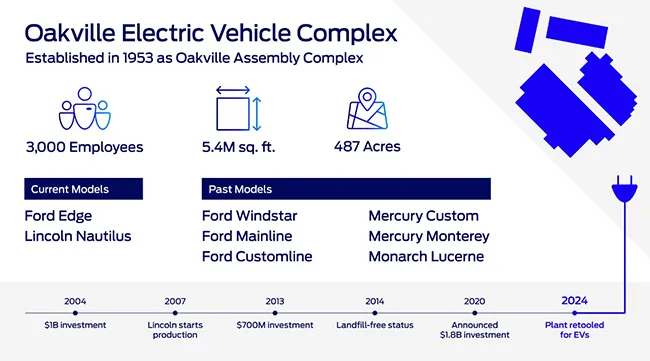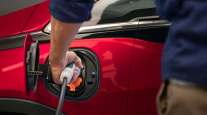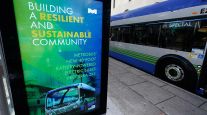The Detroit News
Ford to Transform Ontario Plant Into EV Factory

[Stay on top of transportation news: Get TTNews in your inbox.]
Ford Motor Co. is investing $1.3 billion (C$1.8 billion) to transform its Oakville Assembly Plant in Ontario, Canada, to assemble multiple electric vehicles and battery packs.
The announcement makes due on a commitment reached in the Dearborn, Mich., automaker’s 2020 labor agreement with Unifor, the Canadian autoworkers’ trade union. That included a $1.44 billion (C$1.95 billion) investment into three plants in Ontario, including Oakville, which will be renamed the Oakville Electric Vehicle Complex.
The plant will be the company’s first high-volume transformation of an existing plant in North America to make EVs after Cuautitlán Assembly Plant in Mexico transitioned to build the Mustang Mach-E SUV. The Canadian investment is part of Ford’s $50 billion commitment to electrification by 2026, when it expects to have capacity to produce 2 million EVs globally.
“The transition to EV production in Oakville will not only strengthen our business,” Bev Goodman, Ford Canada CEO and president, said during a briefing conference call, “it will help deliver stable Canadian jobs.”
Oakville employs 3,000 people, and though salaried, skilled-trade and “some” production workers will continue work through the six-month transformation that begins in the second quarter of 2024, temporarily laid-off employees will be back before the end of next year, said Tony Savoni, plant manager.

Ford Motor Co.
Production for delivery will begin in 2025. The plant is expected to return to roughly the same employment, though Savoni hedged the statement, noting it will depend on “market circumstances.” Using the existing plant will allow production to start sooner and with an experienced manufacturing workforce, though employees will undergo on-the-job training in preparation for EV assembly.
Details on which vehicles will replace the gas-powered Ford Edge and Lincoln Nautilus midsize SUVs and what their production would be were not available yet. The SUVs originally were planned to go out of production in 2023.
The new vehicles will be built on Ford’s next-generation electric vehicle platform. As a part of the Unifor agreement, Ford was expected to launch a fifth EV at the plant in 2028, though Goodman was unable to confirm if that still was the case.
In addition to EVs, the plant will assemble their battery packs. The cells and arrays for those packs will come from Kentucky’s $5.8 billion BlueOvalSK Battery Park that will begin operation in 2025. The 407,000-square-foot Oakville assembly site is made possible by improving the flow of parts and other equipment to be able to consolidate three body shops into one, said Dave Nowicki, director of manufacturing operations for Ford’s battery and electric vehicles’ Model e division.
As Ford’s #EV ramp up takes shape across the globe, we will begin to retool and transform the Oakville, Ont. complex in 2Q of 2024 to prepare for production of next-gen #EVs, helping make electric vehicles more accessible to millions of customers. #BuiltFordProud pic.twitter.com/dHkljN7JpJ — Ford Motor Company (@Ford) April 11, 2023
“Most EV companies aren’t able to simultaneously create new manufacturing complexes while they transform existing ones,” he said. “This kind of vertical integration drives incredible freight savings in timing efficiencies, even as we’re delivering EVs at a very high scale.”
Ford’s investment in Oakville as well as in Windsor Engine is being supported by $438 million (C$590 million) in incentives from the Canadian federal and Ontario’s provincial governments. It’s only the latest project in the auto industry to get their support.
Stellantis NV is constructing a $4.1 billion battery plant with LG Energy Solution in Windsor and has announced a total of $2.8 billion for updates to Brampton and Windsor assembly plants in addition to a new battery lab in Windsor. General Motors Co. is shipping electric delivery vans from CAMI Assembly in Ingersoll.
“Ford’s investment in retooling its Oakville plant will support thousands of good-paying jobs and is an important milestone in our plan to become a leader in the electric vehicle revolution,” Premier Doug Ford said in a statement. “Together, with our industry and union partners, we’re building up a world-class, home-grown electric vehicle supply chain, from mining to manufacturing, so that the vehicles of the future are built right here in Ontario, by Ontario workers.”
Want more news? Listen to today's daily briefing below or go here for more info:
Distributed by Tribune Content Agency, LLC




